This post has not been edited by the GamesBeat staff. Opinions by GamesBeat community writers do not necessarily reflect those of the staff.
Well, it's 2011. Last year sure was nice with its oil spills and Haitian earthquakes. This year we've got the Egyptian political riots so far, but who's to say what else will mark the calendar? Something I personally anticipate in early October will be the ten-year anniversary of The United States' War in Afghanistan, which began on October 7, 2001, and is America's second-longest war.
I hope they make it to the big 1-0. What an achievement! I bet the U.S. never expected such prolonged and ineffective occupation when they charged in to kick ass after 9/11. Global conflict always goes on just a bit longer than it should. You know, reality tends to draw things out: regimes, wars, natural disasters…even video game reviews.
Take this article as an example – a review for Call of Duty: World at War that I planned to write over a year ago, which I am publishing only now. Here's what happened.
In January 2010, I wrote a letter to the editors of Bitmob.com. They liked my letter enough to feature it as the prize-winning entry among that week's mailbag.
I asked Dan “Shoe” Hsu if the staff could sign my prizes, and he agreed. In a thank you email, I promised to review the video game portion of my prize, whatever it might be. I felt I should write an article in return for their generosity – what could be better than a review of the game they send?
When the package arrived, I was initially cautious; I checked for any ticking or spring-loaded traps…in case they didn't like my letter after all. With security precautions out of the way, I opened the envelope to find an XNA Games tee and a copy of Call of Duty: World at War on Wii, both signed by the great staff at Bitmob. Admiring my loot, I remembered the promise I gave to Shoe by email. Bitmob sent me World at War, so I was going to review it…eventually.
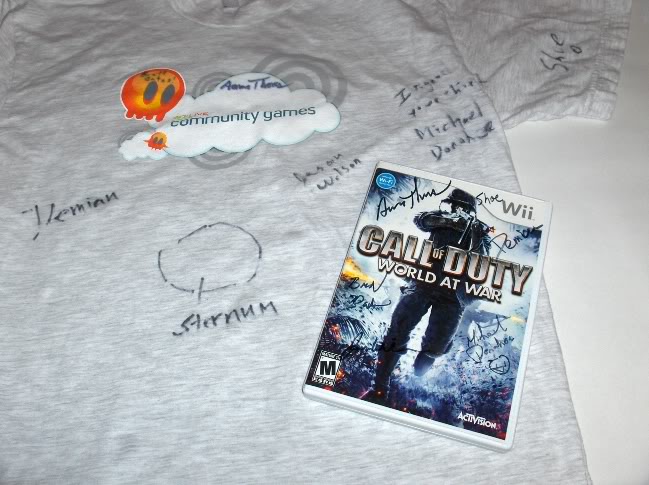
The opportunity to review a game given to me by the Bitmob staff felt like it came with added importance. At the time, I had dreams of becoming a video game industry journalist. The Bitmob editors probably thought nothing of it, but the game they sent was my chance to take on an imaginary freelance project without being “on the job.” Reviewing my prize for Bitmob was a symbolic step toward becoming a professional writer, inconsequential as it was.
When I first sent the email to Shoe about reviewing my prize, I was completely earnest in my promise. Once I got the package, however, my willingness had diminished. My priorities were changing, as they often do in life. I knew that I needed a degree if I wanted to become a professional writer. I decided to study journalism, taking immediate action down that route. I split my writing energy between accumulating an impressive university application and doing well in my remaining college courses. Video game writing took a back seat in my mad dash to fulfill the application requirements. By the end of spring 2010, I was admitted to university as a student of journalism.
Prior to Shoe's email, I had made another video game promise to myself. I felt compelled to review Super Mario Bros. before anything else. Afterward, I would tackle World at War without a moment's hesitation. I sent another email to Shoe clarifying my intentions; he replied without complaint. It's not like we had an official arrangement for this piece, anyway.
Now that I was accepted to university, you'd think I would happily move on to the Super Mario Bros. review I mentioned. Yet a sinister change in my thinking caused me to put that on hold for longer. Due to my enrollment in a university program, I convinced myself to avoid writing any more until my formal training began. It didn't make sense, since writing improves with constant practice. Nevertheless, it seemed like a good idea to “save up” for my game reviews by waiting until I took writing courses. During summer 2010, my game writing went on hold yet again.
School came in the fall, and I returned to writing. My output ramped up in a matter of days. I was taking all journalism courses and submitting written work to my professors each week. I enjoyed the variety of projects and the weekly guest speakers who addressed our class. One of the speakers gave a presentation on developing an online presence through blogging.
I thought back to my own neglected blog left untouched since I wrote the letter to Bitmob. I was instantly motivated to get back in the saddle and write more game reviews. I finished my Super Mario Bros. review and posted it by the end of October 2010. Finally, I could review Call of Duty: World at War unimpeded and fulfill my imaginary agreement with Bitmob.
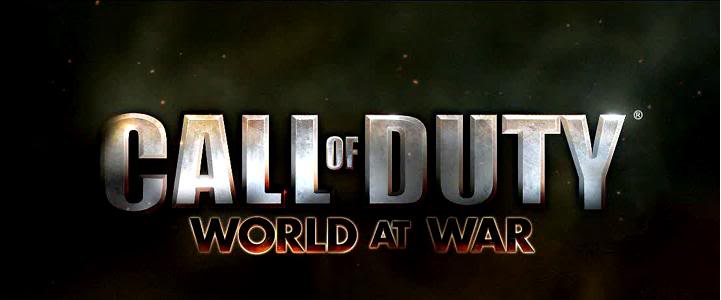
I found it curious that Shoe sent me a Call of Duty game as my prize, as I had reviewed Call of Duty 4: Modern Warfare a few years back. I wondered whether he knew about my familiarity with the franchise because it definitely coloured my opinion of this game. The time I spent playing the 360 version of Call of Duty 4 made me expect a certain level of quality whenever I picked up another Call of Duty game. Unfortunately, those expectations were far higher than the Wii version of World at War could muster.
A Call of Duty game on the Wii is a far shot from realism. Collision detection within the environment poses a serious problem. The collision issues usually occur on barriers such as logs in jungle levels and fences in city levels. The over-extended hit-boxes on these objects deny proper cover usage. I wasn't pleased when I aimed my crosshair above the obstacle, but my bullets wouldn't travel past invisible barriers. Strategy in Call of Duty games calls for gaining sight advantage over enemies by peeking out from cover. This tactic is harder to accomplish while compensating for inexact collision.
The Wii's under-developed graphics hinder the shooting-gallery style action classic to the franchise. When I play Call of Duty on a high-definition console like the 360, I can detect the presence of a hidden enemy by watching for the slightest change in camouflage patterns. On the Wii, low-resolution graphics reduce observing subtle visual cues down to shooting everything that moves. Smeary textures cause unneeded eye-strain when I'm pinpointing enemy figures on the horizon.
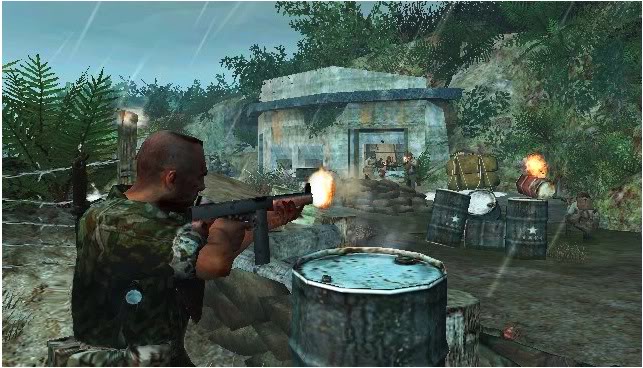
Despite the major deficiencies of the Wii, its motion technology requires more intricate and robust control settings than analog stick setups found on 360 and PS3. The Wii offers gesture commands for reloading and melee, and motion control for aiming the on-screen crosshair. In my experience, I turned off the gesture control almost immediately during my initial play-through; shaking the remote did not work when I needed to keep the same hand steady for aiming.
A further control tweak on the Wii is known as the dead-zone – an invisible box in the middle of the screen that limits where the crosshair can point before rotating the camera. With a large dead-zone, the user aims across most of the screen without turning the character. With a small dead-zone, the user must aim down the middle of the screen and move the camera to alter his or her aim, which is similar to aiming with a dual analog stick controller.
On an easier difficulty, any control configuration is acceptable and workable – the enemies are so weak that it doesn't matter how you aim at them. On the hardest difficulty, however, the play dynamic changes from relaxing to murderous. The enemies on Veteran difficulty have perfect shots and countless grenades. It takes far less damage to get yourself killed. There's no time for dealing with ineffective controls.
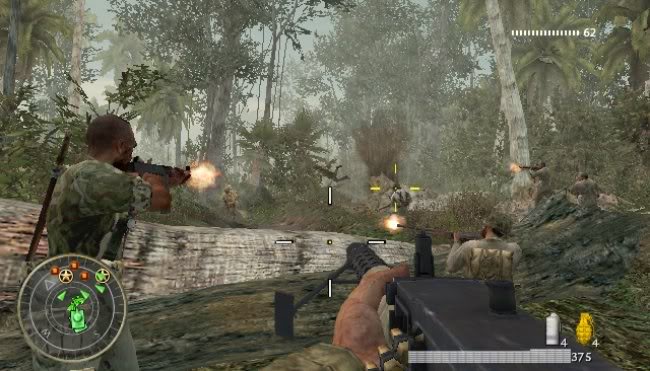
In a standard first-person shooter, the user must control two variables for navigation: character movement and camera positioning. With the inclusion of a dead-zone, the number of movement variables increases to three: character, camera, and pointer. That's too much to think about when one can simply eliminate the pointer movement. By keeping the dead-zone small and the crosshair centered, I mimicked an analog stick control scheme, and beat the game on its hardest difficulty without too much frustration.
Not without any frustration, mind you. The design of World at War completely breaks down on higher difficulties. Level structure is partly to blame; some areas have a dozen enemies firing at your approach before you reach the battle zone. The real culprit, though, is the “friendly” A.I. partners. I can barely call them allies, more like a confederacy of dunces getting in the way of my one man army. They had no awareness of the combat situation, advancing straight into enemy lines when there was a soldier beating me with the butt of his rifle. Occasionally, they drew fire away from my character so that I could run to the next cover, but that didn't happen often.
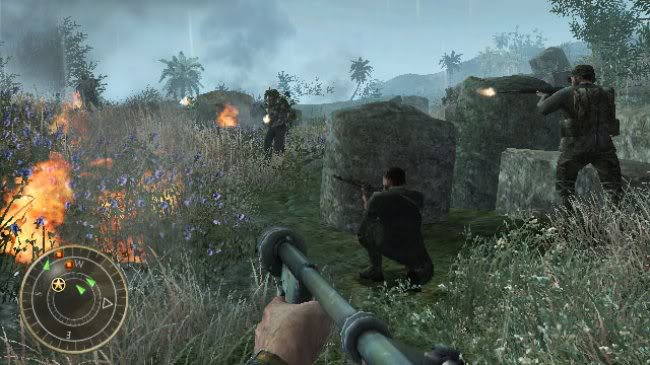
Finishing the game on Veteran difficulty was tough, but not impossible. Even with shaky motion control aiming, I could pick off accurate shots at a distance. Not all the weapons were difficult to use with motion control. The flamethrower, notably featured in the Japanese Pacific sections of the campaign, was ideally suited for swinging around with Wii controls. The skills I picked up playing Pyro in Team Fortress 2 probably helped; I knew how to charge into a room and clear it with a few sweeps of my Wiimote.
Some presentation choices made by the development team were pleasantly surprising. The cut-scenes reminded me of documentaries on the History channel with info-graphics that explained the statistics and progress of World War 2. Treyarch must have had a hefty voice acting budget because Kiefer Sutherland joins you as part of the American squad. It was hilarious to hear the voice of Jack Bauer in a video game telling me to shoot explosive barrels.
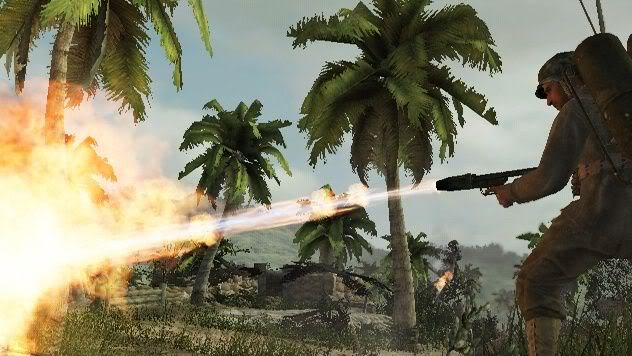
Multiplayer in Call of Duty: World at War doesn't feel on par with the overall series. When I compare Call of Duty 4, released a year prior to World at War, the newer game's online features are downright bad. World at War's re-spawning and matchmaking are noticeably poorer than my extensive use of the same systems in Call of Duty 4. World at War offers only weapon-related online challenges, whereas other Call of Duty games track progress for game modes, special kills, and other noteworthy achievements.
The Wii version's greatest omission is its lack of the Nazi Zombies mode. The score-based survival mode is arguably World at War's best feature on 360 and PS3. A gamer who hears friends hyping up the Zombies mode would be very disappointed to find nothing like it on Wii. There's no specific mention on the packaging that this version is a down-grade, either.
Call of Duty: World at War on Wii lacks many substantial features found in other iterations of the series. The Wii copy doesn't bother to announce these changes, yet it has the same title as on 360 and PS3, which misleads consumers into thinking the versions are identical. For that reason, I recommend any other version of World at War over this one.
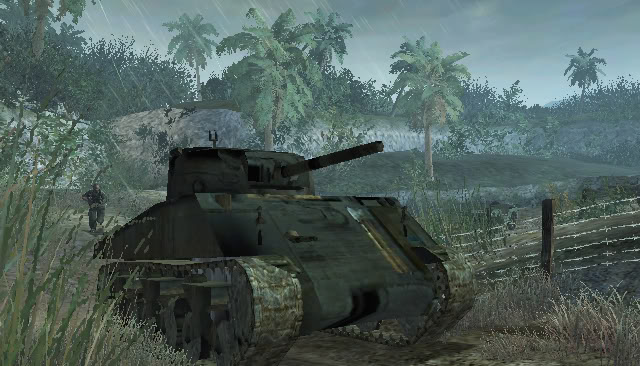
I played through Call of Duty: World at War in November 2010 while attending university. During the semester, my writing ethics gradually changed. I started to resent handing in my work to be judged and graded. Seeking motivation, I thought towards my future as a professional writer, but found little positivity there. Without much warning, one of my greatest ambitions in life dropped to the floor. I stopped attending classes, and I stopped handing in assignments. My academic spirit shut down. I no longer cared about my journalism degree. Why?
Halfway through my first term studying journalism, I realized that I can never write for a living. Don't get me wrong; I still love the act of writing. That's why I didn't abandon this article along with my semester. I enjoy writing as a hobby too much to make it my job. Just because I like to do something doesn't mean I have to earn money doing it. Think about how many people enjoy having sex, yet the vast majority don't become prostitutes. Exchanging my written words for money, as in a salary, or grades, as in academics, felt wrong to me.
I think giving my ideas an external value would cheapen them. I'd much rather keep my writing free and disinterested. Outside influences can be dangerous. Video game journalists are routinely chewed up for selling out to developers who pamper them during coverage. Writers receive blame whenever they're flown out to a ritzy location to see an unreleased title because it “influences” their writing. Well, guess what: the biggest monetary influence on any game journalist is without a doubt his or her employer. Anyone who hands me a paycheck controls why they pay me. If I'm paid to write, I have to expect my employers will control my writing. That's an authority I can't relinquish.

I think all aspiring writers need to face an important fact: paid writers do it for reasons other than writing itself. Professionals want something else, something in exchange for their words. Working as a writer is a valid way of life, but not for those who simply want to write.
As it stands, I've had my revelation, and I'm currently between chapters in life. School is out of the question, so I plan on finding a full-time job. Even with my current sea change, I am eternally grateful that I came to this decision so quickly. Reality has a way of drawing things out too long. In this case, I made an important decision surprisingly fast. I could have easily fallen into several semesters at university before reaching the same conclusion. That is a prolonged and ineffective occupation I do not wish upon myself.
When I wrote to Bitmob in January 2010, I used the phrase “Personally, I'm not looking for praise, or fame, or fortune.” Writing that confused me because I still had hopes of covering the game industry. Now, I understand the truth in my words. I don't want those added luxuries; all I need is complete authority over my writing. It only took me a trip to university and a year-long game review to realize that.
Sorry for the delay, Shoe. Life can be like that sometimes.
(Originally posted on 1UP.com)
For the comments:
- Would you ever consider working as a writer? What would change about your writing habits?
- What do you think about companies who market worse versions of games as the same product?
- I mention that my flamethrower abilities were better for playing Team Fortress 2. Have you ever noticed gaming skills that passed between games?
